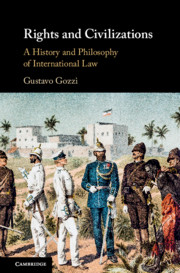Book contents
- Rights and Civilizations
- Rights and Civilizations
- Copyright page
- Dedication
- Contents
- Preface to This English Translation
- Introduction: The West and the Law of Peoples
- Acknowledgments
- A Note on the Contents
- Part I Ius Gentium and the Origins of International Law
- Part II International Law and Western Civilization
- Part III International Law, Islam, and the Third World
- 9 The Law of Peoples and International Law
- 10 Islam and Rights: Islamic and Arab Charters of the Rights of Man
- 11 The Third World and International Law
- Part IV Conditions for Peace
- Glossary of Arab Terms
- Index
10 - Islam and Rights: Islamic and Arab Charters of the Rights of Man
from Part III - International Law, Islam, and the Third World
Published online by Cambridge University Press: 11 February 2019
- Rights and Civilizations
- Rights and Civilizations
- Copyright page
- Dedication
- Contents
- Preface to This English Translation
- Introduction: The West and the Law of Peoples
- Acknowledgments
- A Note on the Contents
- Part I Ius Gentium and the Origins of International Law
- Part II International Law and Western Civilization
- Part III International Law, Islam, and the Third World
- 9 The Law of Peoples and International Law
- 10 Islam and Rights: Islamic and Arab Charters of the Rights of Man
- 11 The Third World and International Law
- Part IV Conditions for Peace
- Glossary of Arab Terms
- Index
Summary
- Type
- Chapter
- Information
- Rights and CivilizationsA History and Philosophy of International Law, pp. 221 - 266Publisher: Cambridge University PressPrint publication year: 2019



